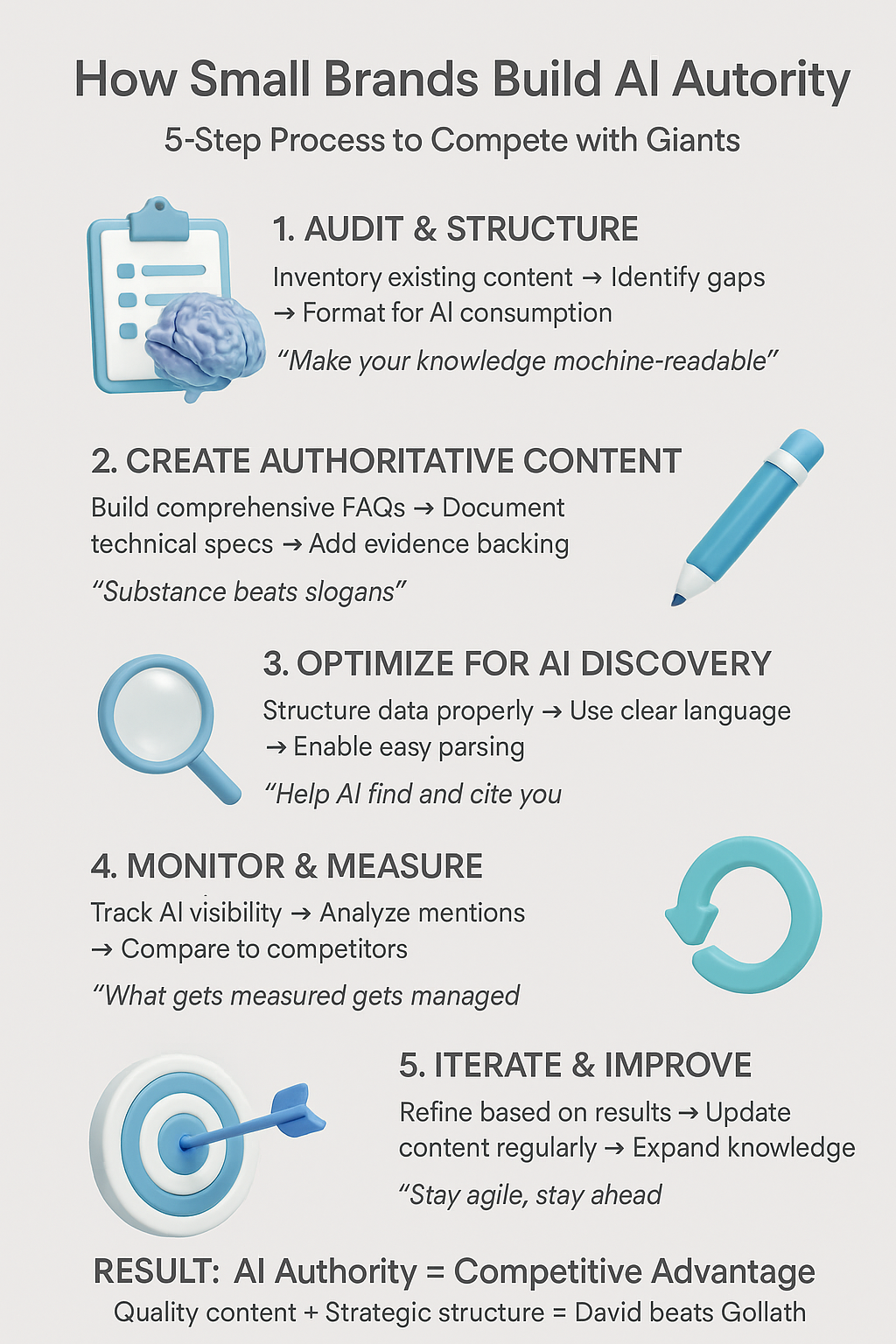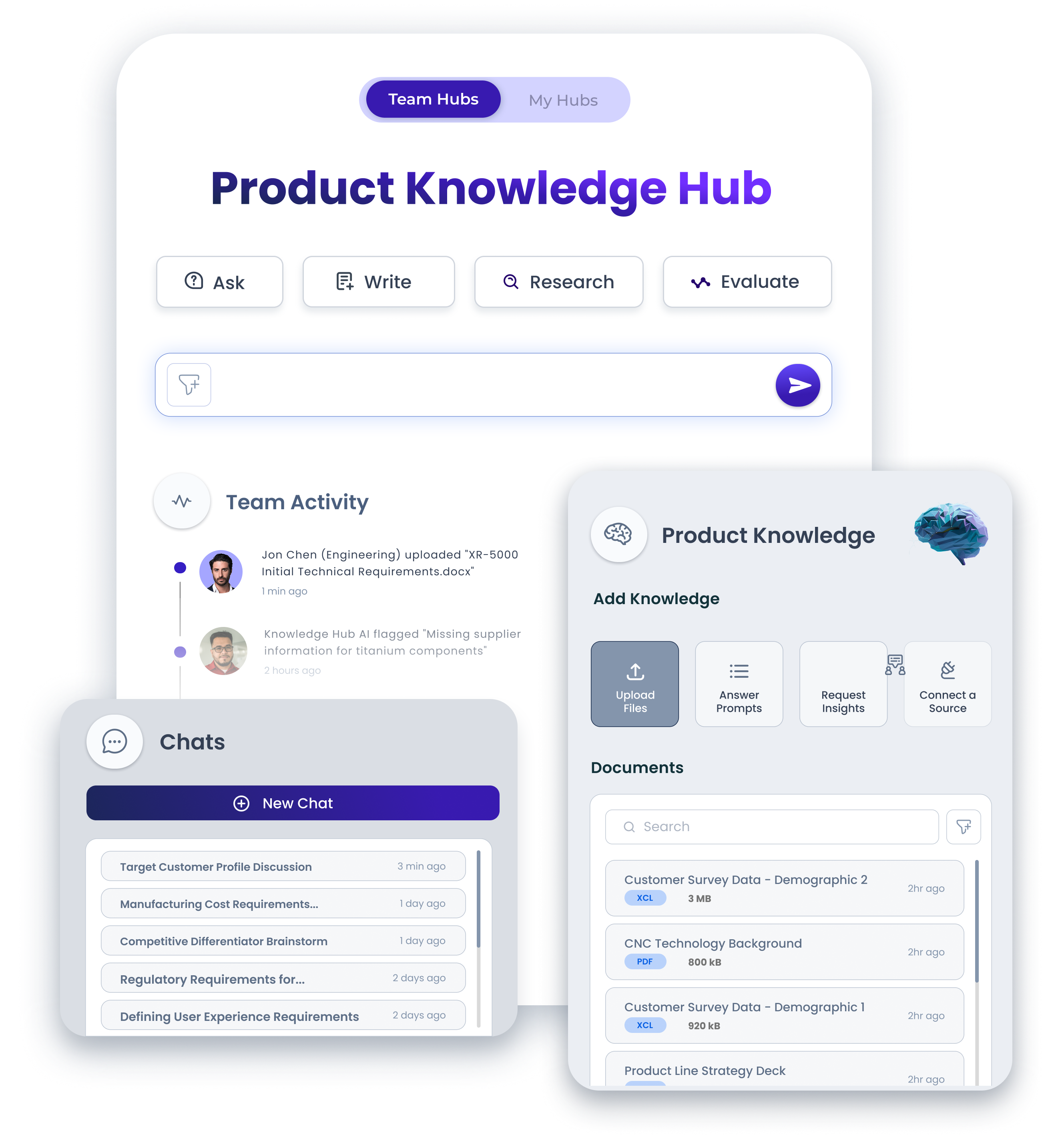
Blog
AI is leveling the playing field for smaller brands. Discover how quality content and technical transparency can help you compete with industry giants in the AI-driven marketplace.
.avif)
The competitive landscape for new product development has long favored established brands with deep pockets. Their substantial R&D budgets, extensive marketing resources, and brand recognition created barriers that were difficult for smaller companies to overcome.
But AI is rapidly changing this dynamic, creating what Pete Blackshaw calls "a great equalizer" in his article "AI and Brands – 10 Realities Brands Can't Ignore." This shift is rewriting the rules of competition, giving smaller brands unprecedented opportunities to challenge industry giants.
The numbers tell the story of this fundamental shift. Google now processes over 14 billion searches daily—a 22% increase from 2024—with AI Overviews appearing for an increasing percentage of queries. Meanwhile, research shows that 60% of Google searches now result in users never leaving the search engine results page, as AI provides direct answers instead of requiring clicks to external sites.
This transformation levels the playing field in unprecedented ways. Unlike traditional search algorithms that heavily weighted domain authority and backlinks (metrics that favor established brands), AI systems prioritize content quality and relevance above historical brand metrics.
"Don't underestimate the nimbleness of small brands," Blackshaw warns larger companies. Many smaller brands are "AI by design" and instinctively focused on serving consumers with transparency and depth that AI systems reward.
This advantage is measurable. Research from Fractl and Search Engine Land shows that while half of marketing professionals feel pressure to adopt AI tools, only 11% worry about overdoing it—indicating that smaller, more agile companies can move faster than larger enterprises constrained by legacy systems and processes.
Without big advertising budgets, smaller companies are often more innovative in their use of AI and more responsive to consumer needs. They build their product documentation and marketing with AI in mind from the start, rather than trying to retrofit legacy systems and content.
The data supports this trend: studies show that AI-native approaches to content creation and knowledge management can automate time-consuming tasks while providing real-time analytics and performance metrics, enabling businesses of all sizes to compete effectively in the digital marketplace.
As Hank Hudepohl, a search strategy expert, explains: "AI doesn't care about your brand's history or advertising budget—it cares about the quality and depth of your content."
This represents a fundamental shift from traditional marketing hierarchies. Research on AI search optimization shows that AI algorithms increasingly prioritize "E-E-A-T" (Experience, Expertise, Authoritativeness, and Trustworthiness) signals that can be built through quality content rather than just brand recognition or advertising spend.
When consumers ask AI systems for product recommendations, the algorithms prioritize:
Large marketing budgets and brand recognition matter less in this environment than the quality and accessibility of product information.

Consumer trust data reveals why smaller brands have significant opportunities in the AI era. According to KPMG's 2024 Generative AI Consumer Trust Survey, 74% of consumers trust organizations that use GenAI in their operations, but 70% of consumers familiar with AI also say AI-generated content makes it harder for them to trust what they see online.
This creates an opportunity for brands that prioritize transparency and authenticity—qualities that smaller brands often embody more naturally than large corporations. Research shows that technical documentation and authentic product information build trust because they're designed "to help the customer use the product well and therefore have a high degree of authority."
Additionally, studies indicate a significant generational divide in AI comfort: 54% of younger adults (ages 25-39) demonstrate heightened comfort with AI capabilities, while only 23% of those aged 65+ feel the same. This demographic trend favors agile brands that can quickly adapt to AI-driven consumer behaviors.
We're already seeing smaller brands successfully leverage AI to compete with industry giants, backed by concrete evidence:
Sustainable Products Sector:Companies like Blueland have outranked major competitors in AI-generated answers about sustainable cleaning solutions by providing detailed chemistry information in accessible formats. Research supports this approach, showing that brands with comprehensive, topically relevant content consistently outperform larger competitors in AI responses.
Direct-to-Consumer Success:Challenger brands in various sectors consistently appear in AI recommendations despite competing with global giants, thanks to their detailed product information and transparent documentation. Analysis of AI search results confirms that brands establishing authority through comprehensive content outperform those relying solely on traditional marketing metrics.
Technology and SaaS: Software companies with comprehensive technical documentation report higher customer retention rates and improved visibility in AI-generated responses, demonstrating that quality content can overcome resource disadvantages.
These smaller brands have built their product knowledge bases and documentation with both humans and AI in mind, giving them visibility that their marketing budgets alone could never achieve.
Just as we saw the rise of digital-native brands that built their business models around e-commerce and social media, we're now witnessing the emergence of AI-native brands that design their entire approach to product development and marketing with AI in mind.
This trend is supported by research showing that AI-driven content strategies can significantly impact consumer trust when implemented thoughtfully. AI-native brands understand that content quality and structure matter more than traditional marketing spend.
At Narratize, we've seen how startups and smaller companies can leverage our Product Knowledge Hub to compete with much larger enterprises. These emerging brands use our platform to structure their product information for AI consumption, creating comprehensive documentation that gives them visibility far beyond their marketing reach.
These AI-native brands:
This approach gives smaller companies the ability to compete effectively against much larger rivals, particularly in categories where product knowledge and transparency matter to consumers.
The AI equalizer effect is particularly pronounced in certain sectors:
Manufacturing and Industrial: Manufacturing companies with detailed technical specifications and compliance documentation have natural advantages in AI-driven search. Smaller manufacturers can compete by structuring their technical knowledge effectively.
Chemicals and Materials: Chemical and material science companies possess the type of technical, evidence-based content that AI systems prioritize. Smaller companies in this sector can leverage their specialized knowledge to outperform larger competitors.
Life Sciences: Life sciences manufacturers with comprehensive regulatory documentation and clinical data can establish authority through transparent, well-structured content regardless of company size.
Energy and Sustainability: Energy sector companies can compete based on performance data and technical specifications rather than just marketing spend.
If you're a smaller brand looking to leverage this equalizing power of AI, consider these evidence-based approaches:
Build your knowledge base strategically - Research shows that structured, comprehensive documentation consistently outperforms traditional marketing content in AI systems. Create content that serves both humans and AI.
Focus on evidence and transparency - Studies indicate that content with clear evidence backing and transparent authorship performs significantly better in AI-generated responses.
Anticipate questions - Develop FAQs that address the full spectrum of consumer queries about your products. AI optimization research shows that Q&A format content is heavily favored by AI systems.
Leverage domain expertise - Your specialized knowledge can give you authority in AI responses that bigger brands may lack. Technical documentation research shows that expert content builds trust more effectively than promotional materials.
Monitor and iterate - Regularly test how AI systems represent your products and refine your approach accordingly. Analytics data shows that brands actively monitoring their AI presence consistently improve their visibility over time.
Track these metrics to gauge your competitive progress:
Advanced analytics show that smaller brands with strong content foundations often achieve higher engagement rates than larger competitors, translating into better conversion metrics.

The Narratize Product Knowledge Hub helps smaller brands compete with industry giants by transforming their product knowledge into strategic assets that AI systems can easily access and leverage. Our platform enables teams to create comprehensive, structured documentation that gives them visibility far beyond their marketing reach.
Key capabilities that level the playing field:
For smaller companies in manufacturing, chemicals, or other technical sectors, our platform helps transform specialized knowledge into competitive advantages that AI systems recognize and prioritize.
By making it easy to capture, organize, and publish product information, Narratize helps level the playing field, allowing innovative smaller brands to compete based on the quality of their products and transparency of their information, not just the size of their marketing budgets.
The evidence is overwhelming: AI is creating unprecedented opportunities for smaller brands to compete with industry giants. Research consistently shows that content quality, transparency, and technical authority matter more than traditional brand metrics in AI-driven environments.
The companies that will thrive in this new landscape are those that recognize this shift early and invest in building authoritative, structured knowledge bases that both humans and AI systems can easily access and understand.
The AI equalizer is real, and it's rewriting the rules of competition. The question isn't whether this trend will continue—it's whether your brand is ready to punch above its weight in the AI-driven marketplace.
Schedule a demo today to see how we can help your brand compete with industry giants through the power of strategic knowledge management.
References: